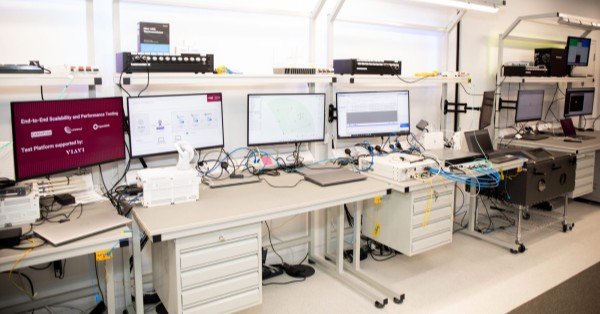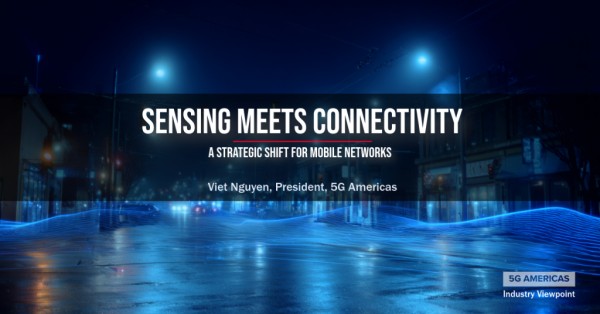Vodafone’s 5G Mobile Private Network (MPN) Deployment at Nuclear Power Plant in Czechia
Vodafone has taken a significant step by launching the first-ever 5G Mobile Private Network (MPN) at a European nuclear power plant. Deployed at the Temelín Nuclear Power Plant in Czechia for ČEZ Group, this marks a key milestone in the digital transformation of critical infrastructure. This project underscores the potential of 5G Private Networks to enhance safety, reliability, and operational efficiency in industries where robust and secure communication is crucial.
Key Communication Challenges for Nuclear Power Plants
Nuclear power plants represent a critical piece of national infrastructure. As such, they face unique challenges in terms of security, operational integrity, and communication. Traditional communication systems like walkie-talkies are still in use but have limited range and capabilities, especially in hard-to-reach areas of the facility. Additionally, communication systems in such environments must remain separate from public networks to ensure data security and avoid potential cyber threats. Low-latency, high-reliability communication is also essential to ensure real-time monitoring, worker safety, and maintenance.
Vodafone’s 5G MPN: The Communication Solution for Temelín Nuclear Plant
Vodafone’s 5G MPN provides a private, dedicated network solution that enhances both the security and communication efficiency at the Temelín plant. Unlike public 5G networks, the MPN operates entirely independently, ensuring that all data remains within the plant’s secure systems. The deployment covers outdoor areas and selected production units, ensuring seamless communication in hard-to-reach locations within the site. Moreover, the introduction of augmented reality (AR) technology—facilitated by the network’s high bandwidth—will empower technicians to perform maintenance and inspections more efficiently, using AR glasses that offer real-time data overlays and remote assistance.
Vodafone’s 5G Private Network ensures low latency, ultra-fast speeds of up to 1 Gbps, and high reliability, providing a robust alternative to legacy communication systems. This is especially valuable in a critical facility like a nuclear plant, where even minor communication lags can have serious consequences.
Pilot Results of 5G MPN Deployment at Temelín Plant
The pilot phase at Temelín demonstrates the effectiveness of 5G MPN in mission-critical environments. Bohdan Zronek, Director of the Nuclear Division at ČEZ, highlighted that the network separation from external systems was a crucial factor. The pilot results, once evaluated, will provide insights into broader applications for private 5G networks in similar environments across Europe.
Vodafone has also had success deploying 5G MPNs in other industries, including the automotive and energy sectors. For instance, its partnership with Škoda Auto in 2022 demonstrated how 5G-enabled automation can streamline operations like automated parking and sensor-based communication at production plants. Similarly, in Germany, Italy, and Ireland, Vodafone has implemented MPNs to optimize operations for companies in chemicals, energy, and even sports sectors.
Why Vodafone Chose 5G for Critical Infrastructure at Temelín
Vodafone’s choice of 5G technology over 4G for this deployment highlights the growing demand for advanced, low-latency solutions that 5G can uniquely provide. While many operators in Europe are still working with 4G Private Networks, Vodafone’s deployment at Temelín sets a precedent for adopting 5G Private Networks in highly secure and regulated industries like nuclear energy. The decision to deploy 5G ensures long-term scalability and readiness for future use cases, including automation, remote monitoring, and AR/VR applications.
Core Advantages of Vodafone’s 5G MPN for Nuclear Power Plants
The primary benefits of Vodafone’s 5G MPN deployment at Temelín include:
- Enhanced Security: Data remains within the plant’s own systems, protecting it from external threats.
- Improved Connectivity: Workers can communicate seamlessly across the site, including remote and hard-to-reach areas.
- Support for Advanced Technologies: The network paves the way for augmented reality tools that can assist technicians in performing complex tasks.
- Operational Continuity: By offering an alternative communication system, the network helps maintain safety and reliability even during public network outages.
These benefits illustrate how 5G Private Networks are essential for critical infrastructure that requires robust, independent communication systems.
The Broader Impact of 5G MPN on Regulated Industries
This deployment is a trailblazer for the adoption of 5G Private Networks in highly regulated industries like nuclear energy. The success of this pilot could encourage similar deployments in other sectors, including utilities, manufacturing, and transportation, where secure, high-speed communication is vital. Vodafone’s ability to meet the unique demands of critical infrastructure highlights the potential for 5G MPNs to become the backbone of Industry 4.0.
Vodafone’s Leadership in 5G and Critical Infrastructure Solutions
As a leader in telecom innovation, Vodafone has consistently pushed the boundaries of 5G and Private Network deployments across Europe. This project underscores Vodafone’s commitment to advancing 5G private networks as a solution for secure, scalable, and high-performance communication in critical industries.
ČEZ Group’s Collaboration with Vodafone on 5G Deployment
The ČEZ Group, one of the largest energy conglomerates in Central Europe, played a pivotal role in facilitating this pilot. Their cooperation with Vodafone highlights the growing interest among energy companies to explore the potential of 5G networks in enhancing operational efficiency and security. The success of this pilot could serve as a model for similar deployments at other ČEZ Group facilities.
Current Status and Future of Vodafone’s 5G MPN at Temelín Plant
The project is currently in the pilot phase, with deployment already in place at key areas of the Temelín plant. Following the pilot evaluation, ČEZ Group will determine whether to roll out similar 5G MPNs at other nuclear and energy facilities.
Violeta Luca, CEO of Vodafone Czechia, emphasized the critical role that 5G Private Networks play in ensuring safety and reliability at sensitive sites like nuclear power plants. Bohdan Zronek from ČEZ also endorsed the network’s importance for ensuring secure, separate communication, making it clear that this technology is essential for the future of nuclear energy management.
Conclusion
Vodafone’s deployment of a 5G Mobile Private Network at Temelín Nuclear Power Plant is a landmark achievement for both the telecom and energy sectors. It showcases the transformative potential of 5G in improving security, operational efficiency, and communication in highly sensitive environments. As the pilot progresses, the broader adoption of 5G Private Networks in critical infrastructure could reshape how industries manage their communication networks, pushing forward the digitalization of critical operations.
For more information on Private Networks and the future of 5G in industrial settings, visit 5G Private Networks.



























